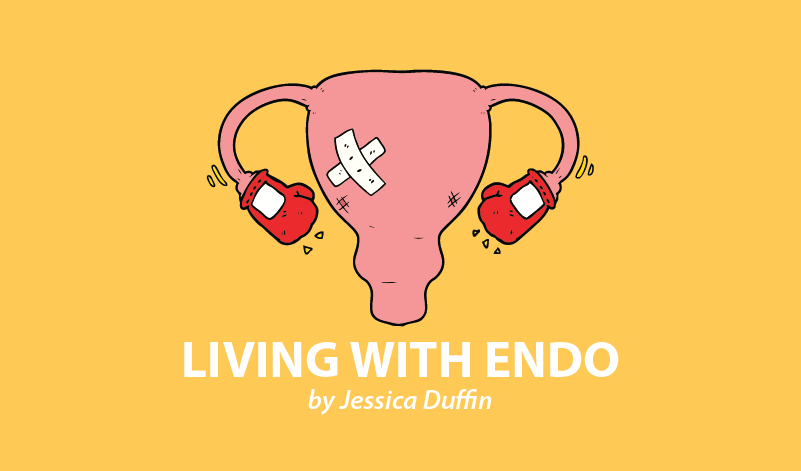
I really fell in love with mindfulness about seven years ago, sitting on the floor of the makeup department of Selfridges in London, at 7 a.m. with at least 100 other people, following the calming voice of Headspace founder Andy Puddicombe.
My road since then is not one of a monk. I did not fall into blissful meditation with a Zen-like ease in the years after that experience. Instead, I embarked on a bumpy path, which mainly started because I just wanted to get some sleep. I had terrible insomnia for a couple of years during this time, and using an app as I lie in bed was what finally helped me master it.
I’ve since used mindfulness to help me deal with the symptoms of endometriosis. From depression and anxiety to pain and even endo brain fog, it has helped me through and has enhanced my life and abilities in a number of ways.
What exactly is mindfulness?
Mindfulness is the practice of being present and of acknowledging our thoughts, feelings, and sensations in that moment without judgment or analysis.
People can be put off by mindfulness, believing they need to sit in absolute silence, emptying their brain of all thoughts. However, mindfulness does not have to be done through meditation, and even then it’s not about emptying your mind, but rather accepting and letting it go.
Mindfulness also can be incorporated into our everyday lives through our actions. We can be mindful when walking, feeling how our feet touch the floor, noticing how our feet feel in our shoes, and observing what we can hear around us. We can be mindful when eating by paying attention to our meal, really savoring the textures, flavors, and aromas, and eating slowly and deliberately instead of in a rushed manner in front of the TV. Many of our physical activities can be made mindful if we choose to stay present in the moment and pay attention to what we’re doing.
How can mindfulness help manage endometriosis?
Depression and anxiety
Studies into mindfulness have shown that the practice can be helpful when dealing with depression and anxiety. Mindfulness allows us to become more aware of the negative thought patterns in our brains and helps us understand how we give these thoughts power. Over time we can begin to step back from these thoughts and see them for just that — thoughts, rather than our realities.
The Mindfulness Project states, “Research has in fact shown that mindfulness can reduce the risk of future clinical depression by 50% in people who have already been depressed several times; its effectiveness is comparable to that of antidepressant medications.”
Research has discovered that the part of the brain responsible for our “fight or flight” response and feelings of fear and anxiety decreases in size after mindfulness.
Headspace also reports that a “systematic review of in-person meditation training found that 69 percent of the studies analyzed showed meditation practice alleviated symptoms of anxiety.”
Endo brain fog
One of my biggest challenges is keeping my brain clear during fatigue and the constant symptoms we’re battling while trying to lead a normal life and hold down a job.
I’ve found that meditating for just five minutes hugely helps my ability to think clearly and in an organized manner for the rest of the day. And it appears there’s a reason why.
Mindfulness has resulted in increased gray matter density in the area of the brain responsible for functions such as planning and problem-solving, as well as an increase in thickness in the hippocampus, which plays a role in learning and memory.
Pain
Perhaps the most useful benefit of all for those with endometriosis is that mindfulness can help us change our relationship with pain. This can be challenging to accept, as a lot of the mindfulness for pain practices include actually feeling into the sensations and sitting with them. Yet, I have tried it, and while it takes practice, over time my response to pain has changed, easing my suffering and the mental torment that only heightens how I’m feeling.
A 1982 study by Jon Kabat-Zinn found that a 10-week, mindfulness-based, stress-reduction course helped more than 50 percent of the participants feel a 33 percent reduction in pain. Psychology Today also reported, “Imaging studies show that mindfulness soothes the brain patterns underlying pain and, over time, these changes take root and alter the structure of the brain itself so that patients no longer feel pain with the same intensity.”
Mindfulness also can help our overall well-being and reactions to stress and helps us feel more appreciative of our lives. It’s so easy to feel angry and resentful of life with endometriosis. But mindfulness has been responsible for some of the most positive changes I have experienced in my quest to manage endometriosis, and hopefully, could help you experience the same.
***
Note: Endometriosis News is strictly a news and information website about the disease. It does not provide medical advice, diagnosis, or treatment. This content is not intended to be a substitute for professional medical advice, diagnosis, or treatment. Always seek the advice of your physician or other qualified health provider with any questions you may have regarding a medical condition. Never disregard professional medical advice or delay in seeking it because of something you have read on this website. The opinions expressed in this column are not those of Endometriosis News or its parent company, BioNews Services, and are intended to spark discussion about issues pertaining to endometriosis.

